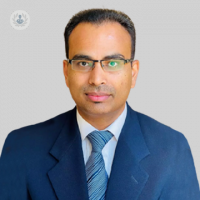Anxiety Disorders: An expert's guide
Written in association with:In his latest online article, Dr Ramesh Muthuswamy gives us his insights into anxiety disorders. He explains the different types, the physical symptoms, how it can be effectively managed and treatment.

What are the different types of anxiety disorders?
Anxiety disorders are a group of mental health conditions characterised by excessive worry, fear or nervousness that can significantly impact a person’s daily life.
Here are some different types of anxiety disorders and they will be diagnosed based on your individual presentation and symptoms.
- Generalised anxiety disorder
- Social anxiety disorder
- Panic disorder
- Phobias
- Post-traumatic stress disorder
- Obsessive-compulsive disorder
- Health Anxiety
- Body dysmorphic disorder
Can anxiety manifest as physical symptoms?
Anxiety can manifest as physical symptoms, and this is a common occurrence in individuals experiencing anxiety disorders or temporary episodes of anxiety.
Here are some common physical symptoms associated with anxiety:
- fast or irregular heartbeat
- breathing fast
- feeling dizzy or faint
- changes in your sexual desire or drive
- sweating
- hot flushes
- sleep disturbance
- dry mouth
- muscle tension
- headaches
- grinding your teeth
- trembling/shakiness
- numbness or tingling sensations
- indigestion, cramps or feeling sick
- going to the toilet frequently
How is anxiety effectively managed?
Managing anxiety effectively typically involves a combination of self-help strategies, lifestyle adjustments, and professional interventions.
Here are some effective ways to manage anxiety:
- Seek professional help: If anxiety significantly affects your daily life, consider consulting a mental health professional, such as a psychologist, psychiatrist, or therapist. They can provide a proper diagnosis and develop a personalised treatment plan for you.
- Cognitive-behavioral therapy (CBT): CBT is a widely used and evidence-based therapy for anxiety disorders. It helps identify and change negative thought patterns and behaviors that contribute to anxiety, promoting healthier coping strategies.
- Medication: In some cases, medication may be prescribed by a psychiatrist to help
manage anxiety, particularly for severe cases or when combined with therapy.
- Relaxation techniques: Practicing relaxation techniques, such as deep breathing, progressive muscle relaxation, or meditation, can help reduce anxiety levels and induce a sense of calmness.
- Exercise regularly: Physical activity has been shown to reduce anxiety by releasing endorphins, which are natural mood elevators. Aim for regular exercise, such as walking, jogging, yoga, or dancing.
- Maintain a balanced diet: Avoid excessive consumption of caffeine, alcohol, and sugary foods, as they can worsen anxiety symptoms. Instead, focus on a well-balanced diet with plenty of fruits, vegetables, whole grains, and lean proteins.
Will patients need to take medication?
Medication can be helpful to manage anxiety and it’s based on your treatment preferences. You may prefer only to receive psychological therapy but medication can be helpful if your anxiety is severe and significantly impacting your daily life.
How long does it take for patients to feel better after starting treatment?
The duration of medication needed to feel better can vary due to individual factors and presentations. If you are prescribed antidepressants like sertraline, you might typically begin to notice improvements within 2-4 weeks. For short-term medications like benzodiazepines, you could experience some relief within 30 to 90 minutes after taking them. However, it's essential to remember that response times can differ among individuals.
Dr Ramesh Muthuswamy is a highly esteemed psychiatrist with over 20 years of experience. You can book an appointment with Dr Muthuswamy today on his Top Doctors profile.



